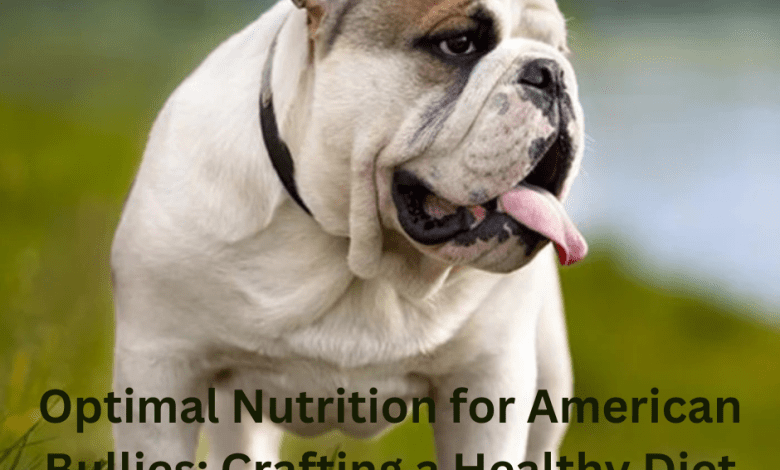Optimal Nutrition for American Bullies: Crafting a Healthy Diet Plan

Introduction
American Bullies are beloved canine companions known for their muscular build, gentle disposition, and loyal nature. Keeping these wonderful pets healthy and happy is a top priority for their owners, and an essential component of their well-being is a proper diet. In this article, we will delve into the American Bully diet plan, exploring the nutritional needs of these dogs, offering guidance on meal planning, and providing tips to ensure your furry friend leads a long and vibrant life.
Understanding the American Bully
Before delving into their dietary requirements, it’s essential to understand the American Bully breed. Originally bred as a family pet, American Bullies are a unique combination of strength and gentleness. Their distinctive appearance, characterized by a stocky build, broad shoulders, and muscular frame, requires a balanced diet to support their growth, energy, and overall health.
Nutritional Needs of American Bullies
Like all dogs, American Bullies require a well-balanced diet that meets their nutritional needs. The key nutrients that should be included in their diet plan are:
- Protein: American Bullies thrive on high-quality protein sources. Protein is essential for muscle development, and a diet rich in protein helps maintain their robust physique. Sources of protein in their diet can include lean meats like chicken, turkey, and beef, as well as fish and eggs.
- Fat: Healthy fats are a vital component of the American Bully diet. These fats provide a concentrated source of energy and support healthy skin and coat. Omega-3 fatty acids, found in fish oil, can be particularly beneficial for their skin and joints.
- Carbohydrates: Carbohydrates provide a source of energy for these active dogs. Whole grains like brown rice, quinoa, and oats can be included in their diet to ensure they have the necessary fuel for their daily activities.
- Fiber: Adequate fiber promotes healthy digestion and can help prevent common digestive issues in American Bullies. Vegetables like carrots, sweet potatoes, and broccoli can be excellent sources of fiber.
- Vitamins and Minerals: Essential vitamins and minerals, such as vitamin A, vitamin D, calcium, and phosphorus, are crucial for the overall health of your American Bully. These nutrients support bone health, immune function, and various metabolic processes.
Creating a Balanced Diet Plan
Now that we understand the nutritional needs of American Bullies, let’s explore how to create a balanced diet plan for your furry friend.
- Consult with a Veterinarian: Before making any significant changes to your dog’s diet, consult with a veterinarian. They can provide valuable insights into your specific dog’s needs, taking into account factors like age, activity level, and any existing health conditions.
- Choose High-Quality Dog Food: Opt for commercial dog food brands that prioritize high-quality ingredients. Look for options that list meat as the first ingredient, as this indicates a good protein source.
- Portion Control: Overfeeding can lead to obesity, a common issue among American Bullies. Follow the recommended portion sizes on the dog food packaging or consult with your vet for specific guidance.
- Supplements: If your vet recommends it, consider adding supplements like fish oil or joint supplements to your dog’s diet. These can help support their overall health and address specific concerns.
- Homemade Meals: Some owners prefer to prepare homemade meals for their American Bullies. If you choose this route, ensure that the recipes are well-balanced and meet all nutritional requirements. Be cautious about offering human food, as some items are toxic to dogs.
- Hydration: Always provide fresh, clean water for your American Bully. Proper hydration is essential for their well-being.
Common Dietary Considerations
Beyond the basics of a balanced diet, there are some specific dietary considerations for American Bullies:
- Puppy Diet: American Bully puppies have different nutritional needs than adult dogs. Puppy food is formulated to support their growth and development, so make sure to transition to adult food at the appropriate age.
- Avoid Toxic Foods: Some foods are toxic to dogs and should be strictly avoided. These include chocolate, grapes, raisins, onions, garlic, and xylitol. Be mindful of what your American Bully has access to in your home.
- Food Allergies: Some dogs may have food allergies or sensitivities. If your American Bully experiences digestive issues, skin problems, or other symptoms, it may be worth exploring food allergies with your veterinarian.
- Weight Management: Obesity is a common issue in American Bullies, which can lead to various health problems. Monitoring your dog’s weight and adjusting their diet accordingly is crucial for their long-term health.
- Regular Feeding Schedule: Establish a consistent feeding schedule for your American Bully. This helps with digestion and can prevent overeating.
Conclusion
The plays a pivotal role in ensuring the health and happiness of these remarkable dogs. By understanding their nutritional needs, creating a balanced diet plan, and following essential guidelines, you can provide your American Bully with the best possible nutrition. Remember that individual dogs may have unique dietary requirements, so always consult with a veterinarian for personalized guidance. With a well-rounded diet and proper care, your American Bully will thrive and be your loyal companion for years to come.
Optimal Nutrition for American Bullies: Crafting a Healthy Diet Plan
American Bullies are a beloved breed known for their robust and muscular build, friendly temperament, and loyal nature. To keep these dogs happy and healthy, providing them with optimal nutrition is crucial. Crafting a healthy diet plan for your American Bully involves understanding their unique dietary needs, selecting appropriate ingredients, and adhering to a feeding regimen that promotes their overall well-being.
Understanding the American Bully’s Dietary Needs
American Bullies are a breed that’s a cross between American Staffordshire Terriers, American Pit Bull Terriers, and other bulldog breeds. These dogs are characterized by their solid, stocky bodies, powerful jaws, and energetic disposition. To maintain their strength and vitality, it’s essential to meet their specific nutritional requirements.
Protein
Protein is the cornerstone of any dog’s diet, and American Bullies are no exception. They require a high-quality source of protein to support their muscle development and overall health. Look for dog foods that list real meat, such as chicken, turkey, or beef, as the first ingredient. These proteins provide essential amino acids that aid in muscle growth and repair.
Ideally, American Bullies should consume around 25-30% protein in their diet. However, individual needs may vary depending on the dog’s age, activity level, and health status. Puppies and highly active adults may require more protein, while older or less active dogs may need less.
Fats
Fats are another vital component of a dog’s diet, providing a concentrated source of energy. Healthy fats, like those found in fish oil, flaxseed, and chicken fat, support skin and coat health, as well as overall immune function. Aim for a diet that contains 10-15% fat content.
Carbohydrates
While American Bullies primarily thrive on a protein-rich diet, carbohydrates should not be overlooked. Carbohydrates supply energy and fiber, aiding in digestion and providing a balanced source of nutrition. Look for dog foods that include complex carbohydrates like sweet potatoes, brown rice, and oatmeal, while avoiding excessive amounts of filler ingredients like corn.
Vitamins and Minerals
Vitamins and minerals are essential for your American Bully’s overall health. Ensure that their diet includes a variety of fruits and vegetables to provide a range of essential vitamins and minerals. Leafy greens, carrots, and berries can be excellent choices to incorporate into their meals.
Water
Don’t forget about hydration. Fresh, clean water should always be available to your American Bully. Proper hydration is essential for digestion, regulating body temperature, and overall well-being.
Crafting a Healthy Diet Plan
Now that we’ve covered the key components of an American Bully’s diet, let’s discuss how to craft a healthy and balanced feeding plan.
1. Consult with a Veterinarian
Before making any significant changes to your American Bully’s diet, it’s crucial to consult with your veterinarian. They can assess your dog’s specific needs, recommend appropriate dietary adjustments, and monitor their health as you make changes.
2. Choose High-Quality Dog Food
Selecting a high-quality commercial dog food is a convenient way to ensure your American Bully receives balanced nutrition. Look for products that meet the Association of American Feed Control Officials (AAFCO) standards for complete and balanced nutrition. Be mindful of your dog’s life stage when choosing food – puppies, adults, and seniors have different nutritional requirements.
3. Consider a Raw or Home-Cooked Diet
Some American Bully owners opt for raw or home-cooked diets. If you choose this route, consult with a veterinary nutritionist to formulate a well-balanced meal plan. Homemade diets require careful planning to ensure your dog gets all the necessary nutrients.
4. Portion Control
Proper portion control is essential to maintain a healthy weight and avoid overfeeding. Follow the feeding guidelines on the dog food packaging, but remember that individual needs may vary. Monitor your dog’s weight and adjust their portions as necessary to keep them at an ideal body condition.
5. Meal Frequency
American Bully puppies typically require more frequent meals, while adults can be fed less often. Consult with your veterinarian to determine the ideal meal frequency for your dog’s age and activity level. Some owners choose to feed their adult American Bullies twice a day.
6. Treats and Snacks
Treats and snacks can be a part of your American Bully’s diet but should be given in moderation. Choose high-quality, low-calorie treats that complement your dog’s nutritional needs. Avoid feeding them table scraps or foods that are toxic to dogs, such as chocolate, grapes, and onions.
7. Monitor Your Dog’s Health
Regularly monitor your American Bully’s health and well-being. Look for signs of allergies, digestive issues, or any unusual behavior. If you notice any concerns, consult with your veterinarian promptly.
8. Transitioning to a New Diet
If you decide to switch your American Bully’s diet, do so gradually. Sudden changes can lead to digestive upset. Mix a small amount of the new food with the old food and gradually increase the ratio over a week or two until the transition is complete.
Common Dietary Considerations
Beyond the basics, there are some specific dietary considerations for American Bullies:
1. Weight Management
Maintaining a healthy weight is critical for American Bullies. Obesity can lead to a range of health issues, including joint problems and heart disease. If your dog is overweight, work with your veterinarian to create a weight management plan.
2. Joint Health
American Bullies are prone to joint issues like hip dysplasia. Consider supplements like glucosamine and chondroitin, which can support joint health and mobility. These supplements are often found in specialized dog foods formulated for joint support.
3. Food Allergies
Some American Bullies may have food allergies or sensitivities. If your dog exhibits symptoms like itching, gastrointestinal upset, or skin issues, it may be worth exploring hypoallergenic diets or working with your vet to identify allergens.
4. Breed-Specific Diets
Some companies offer breed-specific dog foods, including those tailored to bulldog breeds. While these can be convenient, always check the ingredient list and consult with your veterinarian to ensure they meet your dog’s specific needs.
Conclusion
Crafting an optimal nutrition plan for your American Bully diet plan is essential for their health and well-being. Remember that individual dogs may have unique dietary requirements, so it’s crucial to consult with your veterinarian to create a personalized diet plan. By providing a balanced diet, monitoring their health, and making adjustments as needed, you can ensure your American Bully enjoys a long, healthy, and happy life.





